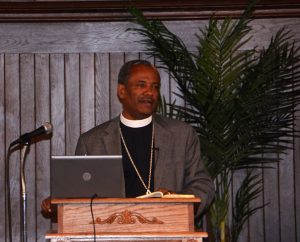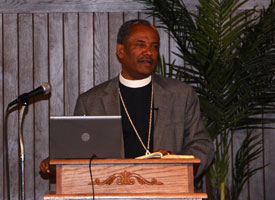The president of the Ethiopian Evangelical Church Mekane Yesus (EECMY) visited both LCMS seminaries Dec. 15-16, further continuing discussions that began earlier in 2014 about the growing relationship between the Synod and the EECMY.
The EECMY is the largest and fastest-growing Lutheran church body in Africa, with about 7 million members.

The Rev. Dr. Wakseyoum Idosa, EECMY president, visited Concordia Theological Seminary, Fort Wayne, Ind.,(CTS) Dec. 15. On Dec. 16, he gave a presentation on the Ethiopian church at Concordia Seminary, St. Louis (CSL).
“It is a great privilege to have the president of the largest Lutheran church in the world (by Sunday attendance) visit the two seminaries of the Missouri Synod,” said the Rev. Dr. Albert B. Collver III, director of LCMS Church Relations and Regional Operations. “The EECMY is interested in increasing her confessional identity as Lutherans, and the best place in the world to study the Lutheran Confessions is the two seminaries of the Missouri Synod.
“At the same time, the particular challenges faced by the EECMY, rapid growth, shortage of pastors, challenges of confessional identity and so forth provide opportunities for the Missouri Synod to share and learn from the EECMY. I look forward to the further mutual exchange between our church bodies,” said Collver.
Concordia Theological Seminary President Dr. Lawrence R. Rast Jr. said in a news release he was happy to celebrate the “relationship that is budding between our seminary and the EECMY.”
“We are partnering already with the EECMY in very important ways, especially by working very specifically and intentionally with the Mekane Yesus Seminary in Addis Ababa,” Rast said.
The Fort Wayne seminary has been providing theological education to Ethiopians for more than a decade, with Ethiopian students traveling to study at the Fort Wayne campus. Faculty members also teach at the Mekane Yesus Seminary.
Idosa expressed thanks in comments at the Fort Wayne seminary.
“We are thankful for your prayers and also for the support you are contributing,” Idosa said, according to the CTS news release. “I ask you to continue to uphold us in your prayers and also walk together with us as we are engaging in God’s mission to serve the Ethiopian society and beyond.”
During his presentation at the St. Louis seminary, Idosa discussed the extraordinary growth of his church body, which grew from 20,000 members in the late 20th century to about 7 million today.
Idosa described the EECMY as a spiritually vibrant and mission-passionate church.
“The EECMY has this in common with you: enthusiasm for bringing the Gospel to our neighbors,” he said. He also emphasized the Ethiopian church’s commitment to economic development, health services and education in the name of the Gospel.
The CSL lecture followed a November visit to Mekane Yesus Seminary in Addis Ababa by a Synod delegation.
“It’s an honor to return the greeting,” said the Rev. Dr. Jeff Kloha, CSL provost, who was part of the delegation that traveled to Ethiopia. “The LCMS and the EECMY have worked cooperatively for many years and recently have begun to discuss ways to work more closely, especially in theological education.”
Several EECMY leaders have completed graduate programs at CSL. Two pastors are currently enrolled. The seminary also has trained expatriates from Ethiopia to work with immigrant communities in the United States through its Ethnic Immigrant Institute of Theology, which began in 2002.
“Over the last 175 years, Concordia Seminary has prepared thousands of theologians and pastors for the ministry of the Church of God,” Idosa said, according to a CSL news release. “This seminary is continuing to build the life of its students on sound biblical and theological understanding of the mission entrusted to the Church of God to enable them to intentionally prepare men and women for God’s Kingdom. It is a great opportunity for the EECMY and its theological seminaries to partner with Concordia Seminary, St. Louis, and share in the blessings of this rich experience in the process of building the capacity of our evangelists, pastors and theologians for nurturing members of the fast growing EECMY.”
The EECMY was established in 1959, when it had about 20,000 members in some 100 congregations. It grew out of mission work started by several northern European churches and The American Lutheran Church — one of the church bodies that eventually formed what is now the Evangelical Lutheran Church in America (ELCA).
The EECMY ended its formal fellowship with the ELCA in spring 2013, primarily due to concerns that the ELCA’s allowing gay and lesbian clergy was counter to the Holy Scriptures.
In January 2014, EECMY and LCMS representatives met in Addis Ababa to discuss entering formal discussions about the relationship between their churches, leading to plans for beginning those discussions Nov. 10-13 in Addis Ababa.
In November, EECMY and LCMS representatives and leaders met at the Mekane Yesus Seminary, the EECMY headquarters and the Gudina Tumsa Wholistic Training Center to discuss the relationship between the two church bodies, revise an extended working agreement and make plans to strengthen theological education within the Mekane Yesus Church by creating a relationship between the two church bodies’ seminaries.
After the discussions, the delegates of the EECMY and LCMS team signed a working-partnership agreement. The agreement emphasizes the ongoing need for the two churches to understand one another better and to identify the challenges that are common and unique to both churches. While formal pulpit and altar fellowship remains a goal, both churches are committed to continuing their current shared efforts, as well as regular and ongoing discussions of theology and practice.
This partner agreement is a revision of the 2010 agreement between the Department of Mission and Theology of the EECMY and the World Mission Department of the LCMS. The revised agreement signed in Addis Ababa was between the two church bodies, rather than between units within the church bodies. This demonstrates increased commitment between the EECMY and LCMS to become closer to one another.
